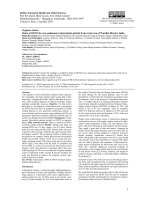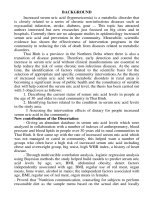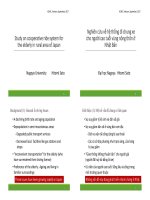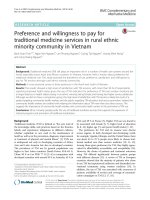Assessment of supplementation of soy-poha ladoo for prevention of malnutrition in rural area of Ratlam district, India
Bạn đang xem bản rút gọn của tài liệu. Xem và tải ngay bản đầy đủ của tài liệu tại đây (148.07 KB, 4 trang )
Int.J.Curr.Microbiol.App.Sci (2018) 7(12): 393-396
International Journal of Current Microbiology and Applied Sciences
ISSN: 2319-7706 Volume 7 Number 12 (2018)
Journal homepage:
Original Research Article
/>
Assessment of Supplementation of Soy-Poha Ladoo for Prevention of
Malnutrition in Rural Area of Ratlam District, India
Barkha Sharma1, Jagdish Patidar2*, S. Tripaty3 and D.R. Pachaury4
1
SMS Home-Science, 2SRF- NICRA Project, 3Senior Scientist and Head, 4Farm Manager
Krishi Vigyan Kendra, Ratlam (M.P), India
*Corresponding author
ABSTRACT
Keywords
Soyladoo,
Anthropometric
measurements
Article Info
Accepted:
04 November 2018
Available Online:
10 December 2018
The food and nutrition security of the population has been the matter of concern world
over. Problem in attaining food and nutrition security is prominent particularly in
developing world. Protein calories malnutrition is major nutritional problem of the world.
To treat malnutrition among the pre-school children the formulation of locally based
protein rich product is must hence attempt was made to formulate soy based food product
such as soy-poha ladoo. krishi vigyan Kendra Ratlam conduct a study during 2015-16 to
2017-18 on assessment of supplementation of soy-poha Ladoo to assess the effectiveness
of protein and iron supplementation for improving protein energy malnutrition (PEM) on
health of pre-school children in rural area of Ratlam district of MP. This product was
evaluated for its major nutrient content like carbohydrate, energy, protein and fat. The 40
malnourished pre-school children of five anganwadies were selected by conducting camp
are classified as two groups. In the present study soy-poha ladoo recorded highest height
(88.9 cm), weight (13.95 Kg) and BMI (15.69) indicates positive effect of supplementation
of locally available protein and iron rich food source like soybean and poha.
Soybean has been identified as a low cost
nutrition rich food raw material which has
potential to help enhance the food availability
with nutrition. The soybean has been
honoured as a food raw material for
incorporation in the diet of nutritionally poor
segment. The fact that properly processed
soybean also extends health benefits to
consumers; it serves as a boon to the
consumers in improving the health.
They are still growing rapidly but have not
fully developed independent feeding skills in
the earlier years of this era; they remain totally
dependent on an adult. Sometimes growth
failure may occur even in the presence of
normal meal patterns because the energy
density of the diet is inadequate. The
nutritional problems which manifest as a result
of malnutrition prior to and during the infancy
and early childhood has an impact on health,
general growth and development of children
(Sarada and Mrudula, 2016).
Children between one and five years of age
remain at significant risk of under nutrition.
According to Ghosh et al., (2006) nutritional
problems like protein energy malnutrition,
Introduction
393
Int.J.Curr.Microbiol.App.Sci (2018) 7(12): 393-396
anemia and vitamin – A deficiency continue to
plague a large proportion of Indian children.
The diets and nutritional status of urban slum
children in India is far away from being
satisfactory. High prevalence of malnutrition
among young children is also due to lack of
awareness and knowledge regarding their food
requirements and absence of a responsible
adult care giver. Improving nutritional status
of urban poor requires a more direct, more
focused, and more integrated strategy.
Soybean is one of the most important legumes
having more than 40 per cent protein
combined with 20 per cent oil (Deshapande,
1990). It can be effectively used for
supplementing cereals based products due to
of its amino acids profile. Beside it has a good
source of minerals, vitamins antioxidants and
better neutral-citical properties (Ketarpau and
Goyal, 2008). Soybean is a complete plant
protein. Due to its high biological value and
content good numbers of essential amino acids
it can be use to prevent protein calorie
malnutrition among vulnerable groups in the
community (Ghatge, 2014).
Soybean was targeted to be used in India, as
major protein source to meet nutritional
requirements. soybean contains, other than
43% protein, 19.5% fat, 21% carbohydrate
and provides 432 kcal per 100 g. Soybean can
make significant nutritional contribution if
typical traditional foods are supplemented
with properly processed soybean in
combination with cereals.
Objective
To assess the effectiveness of protein and iron
supplementation for improving protein energy
malnutrition on health of pre-school children.
Hence, by taking into account the different
properties of soybean, it is considered to use
for the soya ladoo supplementary food
product. The data regarding formulation,
preparation and evaluation of soya ladoo were
collected.
Materials and Methods
This study was carried out during 2015-16 to
2017-18 at five angan wadies located at
different location in Ratlam district of Madhya
Pradesh (India). Wheat is the staple food of
the district. In the present investigation, 40
malnourished pre-school children were
selected by conducting camp and they were
supplied with 100g of soy-poha ladoo for 90
days with various food ingredients. The
following treatments have been decided based
on food supplemental diet provided to the
same children for 90 days and considerable
changes were noted accordingly.
Soya ladoo
The local varieties of soybean and Bengal
gram were procured from the market. It was
cleaned, washed, dried, coarsely grind, dehulled and made into flour separately by use
of grinding machine. Soy-poha ladoo was
prepared by use of appropriate formulations.
Treatments
1. T1daily diet (without providing
supplements)
2. T2- Provided with 100 grams of SoyaPoha Ladoo Daily (90 days)
First group of 20 children were not provided
with any nutritional supplements i.e as on their
daily diet intake, which were treated as control
(T1). The next group of 20 children was
supplemented with 100 grams of soy-poha
ladoo daily for 90 days. On the basis of
nutritional composition of basic ingredients
(Table 1), the nutritional content of soy-poha
ladoo were estimated as presented in Table 2.
From Table 2 it is seen that the 100g of
394
Int.J.Curr.Microbiol.App.Sci (2018) 7(12): 393-396
soy-poha ladoo contains 343.40 kcal, 102.25g
fat, 6.87g protein, 0.57g Fiber, 63.40mg
calcium and 8.26mg iron. Soy-poha ladoo
prepared with combination of soybean flour,
besan, ghee, poha and jagrgery, and supplied
to subject through daily diet for 90 days. After
90 days anthropometric Measurements was
recorded.
measurement, data of the subjects is presented
in table 3. The highest average height (88.55
cm), weight (13.52kg) and BMI (15.27) was
recorded after intervention and the per cent
increase of height, weight and BMI is 0.62%,
8.66% and 8.06 % respectively as compared
to before intervention 88.0cm (height),
12.44kg (weight) and 14.13 (BMI). Whereas
among the treatment T2 recorded highest
height (88.9 cm), weight (13.95Kg) and BMI
(15.69) as compared to T1 88.2cm (Height),
13.10Kg (weight) and 14.85 (BMI)
respectively after intervention. Within the
treatment per cent increase of height (0.90%),
weight (9.06%) and BMI (8.13%) was
significantly observed by T2, as compared to
T1 (0.34%, 8.26% and 7.92%)
Results and Discussion
As the pre-school children were recognized as
a priority target group and to increase their
anthropometric measurement level was the
aim of the present investigation, the effect of
soy-poha ladoo prepared and supplied to the
subjects was observed as recorded in Table 3.
According
to
basic
anthropometric
Table.1 Composition and nutritional contents of basic ingredients for soy- poha ladoo
Items
Amt
(g)
Energy
(Kcal)
Fat
(g)
Protein
(g)
Fiber
(g)
Calcium
(mg)
Iron
(mg)
Vit.A
(IU)
40
Folic Acid
(IU)
73.2
Poha
200
692
2.4
13.2
1.4
40
Besan
50
186
2.8
10.4
0.6
28
2.65
50
64.5
Soybean
flour
50
216
9.75
21.6
1.85
120
5.2
4.95
213
Jaggery
300
1149
0.3
1.2
Ghee
75
75
675
-
-
240
7.92
-
-
-
-
-
-
-
Total
675
2318
690.25
46.4
3.85
428
55.77
128.15
277.5
-
Table.2 Nutrient content of soy-poha ladoo per 100g
Energy
(kcal)
343.40
Fat (g)
Protein (g)
Fiber (g)
102.25
6.87
0.57
Calcium
(mg)
63.40
Iron (mg)
Folic
(IU)
18.98
8.26
acid
Vit.A (IU)
4.11
Table.3 Changes in Anthropometric Measurements
Height (cm)
RESULT
S
T1
T2
Mean
Weight (kg)
BMI
Before
interventio
n
After
interventio
n
%
increas
e
Before
interventio
n
After
interventio
n
%
increas
e
Before
interventio
n
After
interventio
n
%
increas
e
87.9
88.1
88.0
88.2
88.9
88.55
0.34
0.90
0.62
12.10
12.79
12.44
13.10
13.95
13.52
8.26
9.06
8.66
13.76
14.51
14.13
14.85
15.69
15.27
7.92
8.13
8.06
395
Int.J.Curr.Microbiol.App.Sci (2018) 7(12): 393-396
Height, weight and BMI respectively shown
in table 4 depict the height, weight and body
mass index is higher than the traditional
technology. Maximum increased height,
weight and body mass index was observed
with soy-poha ladoo.
cost nutritional supplement it is suitable for
anganwadi children.
References
Deshapande, S.D. (1990). Studies on some
engineering aspect for processing and
utilization of soybean. Ph.D Thesis, post
harvest- technology centre. Indian
Institute of Technology, Kharagpur,
U.P. (India).
Ghatge, N.S. (2014). Study of nutritional
composition analysis of soya based
formulated food products. Food Sci.
Res. J. 5(1): 7-10.
Khetarpaul, N. and Goyal, R. (2008).
Development of soy nutries and fried
soy dhal: Sensory and nutritional
evaluation. J. Food Sci. Technol., 45(1):
105-107.
D. Sarada and M.R. Mrudula, (2016) Millet
pulse ladoo as a nutritional supplement
for pre-school age (anganwadi)
children.
International
Research
Journal of Natural and Applied
Sciences, Vol. 3, Issue 2, Feb 216.
Shanti Ghosh, (2006). Child rights: Integrated
Child
Development
Services
Programme, DPH Pvt. Ltd., New Delhi,
94.
In conclusion, results of the study clearly
indicate positive effect of supplementation of
locally available protein and iron rich food
source like soybean and poha. However, the
study gave encouraging results still more
concentrated efforts are needed to arrive at
conclusion on a large group. The children in
growing age show increase in height, intake
of nutritional supplementation and its
acceptance and consumption by the children
contributes to children growth and
development. The nutritional supplementation
to the experimental group for a period of 90
days contributed to increase in all the three
anthropometric measurements: height, weight,
body mass index. The control group children
also showed increase in height, weight, body
mass index but low growth rate. Which may
also be attributed to regular nutritional
supplementation in anganwadi centres. Yet
the soy-poha ladoo proved to contribute in
better nutrition of anganwadi children due to
its nutritive value and acceptance as a low
How to cite this article:
Barkha Sharma, Jagdish Patidar, S. Tripaty and Pachaury, D.R. 2018. Assessment of
Supplementation of Soy-Poha Ladoo for Prevention of Malnutrition in Rural Area of Ratlam
District, India. Int.J.Curr.Microbiol.App.Sci. 7(12): 393-396.
doi: />
396









